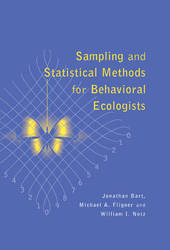
|
Sampling and Statistical Methods for Behavioral Ecologists
Hardback
Main Details
| Title |
Sampling and Statistical Methods for Behavioral Ecologists
|
| Authors and Contributors |
By (author) Jonathan Bart
|
|
By (author) Michael A. Fligner
|
|
By (author) William I. Notz
|
| Physical Properties |
| Format:Hardback | | Pages:344 | | Dimensions(mm): Height 229,Width 152 |
|
| Category/Genre | Probability and statistics
Animal behaviour
Applied ecology |
|---|
| ISBN/Barcode |
9780521450959
|
| Classifications | Dewey:577.072 |
|---|
| Audience | | Professional & Vocational | |
|---|
| Illustrations |
11 Tables, unspecified; 38 Line drawings, unspecified
|
|
Publishing Details |
| Publisher |
Cambridge University Press
|
| Imprint |
Cambridge University Press
|
| Publication Date |
10 December 1998 |
| Publication Country |
United Kingdom
|
Description
This book describes the sampling and statistical methods used most often by behavioral ecologists and field biologists. Written by a biologist and two statisticians, it provides a rigorous discussion together with worked examples of statistical concepts and methods that are generally not covered in introductory courses, and which are consequently poorly understood and applied by field biologists. The first section reviews important issues such as defining the statistical population and the sampling plan when using non-random methods for sample selection, bias, interpretation of statistical tests, confidence intervals and multiple comparisons. After a detailed discussion of sampling methods and multiple regression, subsequent chapters discuss specialized problems such as pseudoreplication, and their solutions. It will quickly become the statistical handbook for all field biologists.
Reviews'I found the book was clearly written and quite easy to read. There is a place for a book like this, and it will be useful to many ... ' David L. Thomson, Animal Behaviour 'The book is well-structured and statistical argumentation is illustrated with many biological examples. I recommend it strongly to biologists who are interested in learning what kind of problems can occur in the analysis of animal behaviour.' Ethology
|